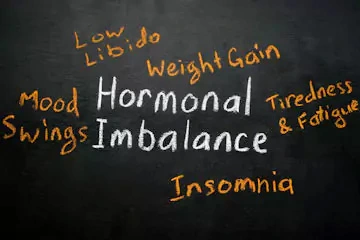Unexplained weight gain can often feel frustrating and confusing, especially when it doesn’t seem to have an obvious cause. One common culprit that is often overlooked are hormonal imbalances. Specifically, thyroid issues and elevated cortisol levels can significantly impact weight management. Understanding how these hormones affect your body can help you identify the root cause of your weight gain and take steps toward balance.
1. The Thyroid and Its Role in Metabolism
The thyroid is a butterfly-shaped gland located in your neck, and it plays a central role in regulating metabolism by producing thyroid hormones (T3 and T4). These hormones control the speed at which your body burns calories, and any disruption in thyroid function can result in weight fluctuations.
- Hypothyroidism (an underactive thyroid) is the most common thyroid imbalance linked to weight gain. With hypothyroidism, the thyroid doesn’t produce enough hormones, causing your metabolism to slow down. This results in symptoms like fatigue, depression, constipation, and unexpected weight gain, particularly around the abdomen.
- Hyperthyroidism (an overactive thyroid), on the other hand, speeds up metabolism and often leads to weight loss. However, this condition can cause its own set of issues, such as nervousness, rapid heartbeat, and anxiety.
How to address it:
- Testing: A simple blood test can measure thyroid hormone levels and identify imbalances.
- Treatment: If diagnosed with hypothyroidism, thyroid hormone replacement therapy (levothyroxine) is commonly prescribed. Lifestyle changes, including eating a balanced diet rich in iodine and selenium, can also support thyroid health.
2. Cortisol: The Stress Hormone Impacting Weight
Cortisol is known as the “stress hormone,” produced by the adrenal glands in response to stress. While cortisol has many essential functions, including regulating blood sugar and blood pressure, chronic stress can lead to elevated cortisol levels, which can wreak havoc on your metabolism.
- Chronic Stress and Cortisol: When cortisol levels remain high for extended periods, it can result in increased appetite, particularly for high-calorie, comfort foods, and may also promote fat storage, especially around the abdomen.
- Cortisol and Insulin Resistance: Chronic stress can increase insulin resistance, making it harder for your body to regulate blood sugar, leading to fat accumulation and weight gain. Elevated cortisol can also interfere with sleep, further disrupting your body’s ability to balance hormones effectively.
3. The Connection Between Thyroid and Cortisol
It’s important to recognize that thyroid imbalances and elevated cortisol levels often go hand in hand. Chronic stress can impact thyroid function, and thyroid issues can make it more difficult for the body to cope with stress, creating a vicious cycle.
- Cortisol’s Impact on Thyroid Function: High cortisol levels can interfere with the conversion of T4 (inactive thyroid hormone) to T3 (active thyroid hormone), exacerbating symptoms of hypothyroidism.
- Thyroid Imbalances and Stress: Conversely, an underactive thyroid can make the body more sensitive to stress, leading to higher cortisol levels.
How to address it:
- Comprehensive Testing: If you suspect both thyroid and cortisol imbalances, it’s important to have a healthcare provider assess both systems. Salivary or blood tests can measure cortisol levels throughout the day, and thyroid hormone tests can identify potential imbalances.
- Holistic Approach: Combining stress reduction strategies, a healthy diet, and proper thyroid management can help break the cycle of hormonal imbalance and support healthy weight regulation.
Unexplained weight gain may not always be related to diet or exercise alone—hormonal imbalances, particularly thyroid dysfunction and elevated cortisol levels, can play a significant role in how your body stores fat and burns calories. Identifying and addressing these imbalances with the help of a healthcare provider can lead to more effective weight management and improved overall health. If you suspect hormonal issues are affecting your weight, seeking professional guidance is an important step toward getting back on track.




